Best of #econtwitter - Week of March 20, 2022 [1/2]
Mar 21, 2022
Welcome readers old and new to this week’s edition of Best of Econtwitter. Thanks to those sharing suggestions, over email or on Twitter @just_economics.
This is part one of two. Part two is here.
Paper summary threads

Jan Feld@EconFeld
Does academic writing matter?
Does better writing cause our peers (eg as referees and journal editors) to evaluate our papers more favorably?
Our paper “Writing Matters” (with @CorinnaRGL and Libby Ross) suggests it does!janfeld.weebly.com/uploads/1/1/8/… #EconTwitter. A thread. (1/11)

9:40 PM · Mar 14, 2022
145 Reposts · 582 Likes
^same paper:

Ulf Zölitz@uZoelitz
Effect are economically significant:
- Perceived writing quality increases by 60% of a SD after editing (first stage)
- Edited papers become 14% more likely to be accepted for a conference
-Your referees and editors become 12% more likely to see your paper in a top field journal

1:29 PM · Mar 15, 2022
1 Repost · 11 Likes

John B. Holbein@JohnHolbein1
COLLEGE IS SO EXPENSIVE!!!!!!!!
Yes. But it's also *very* progressively priced.
Don't just look at the sticker prices for higher education.
nber.org/papers/w29829
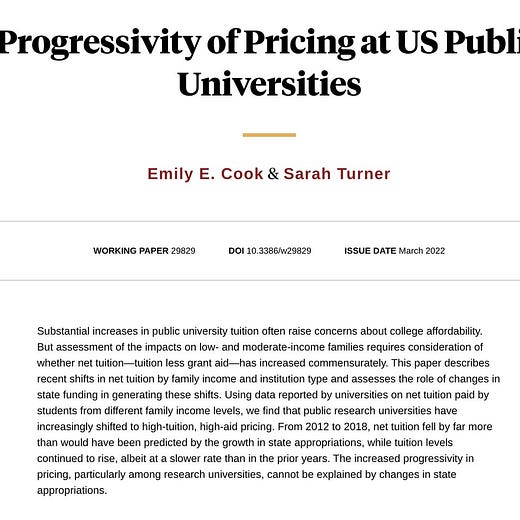
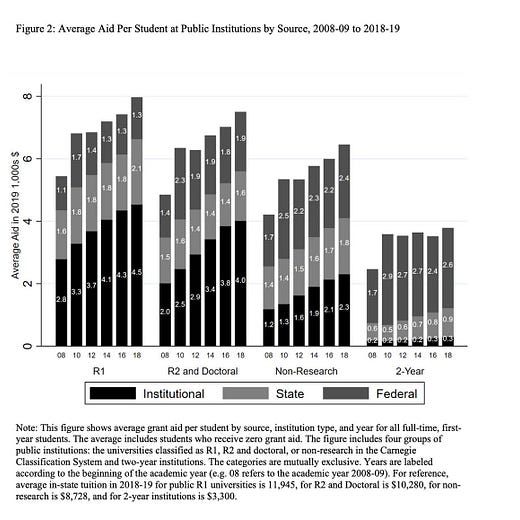
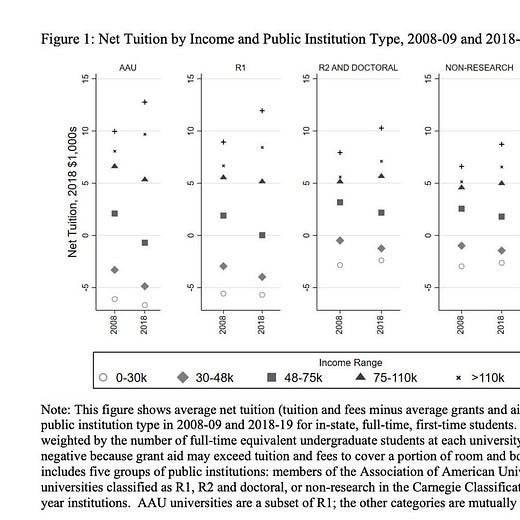
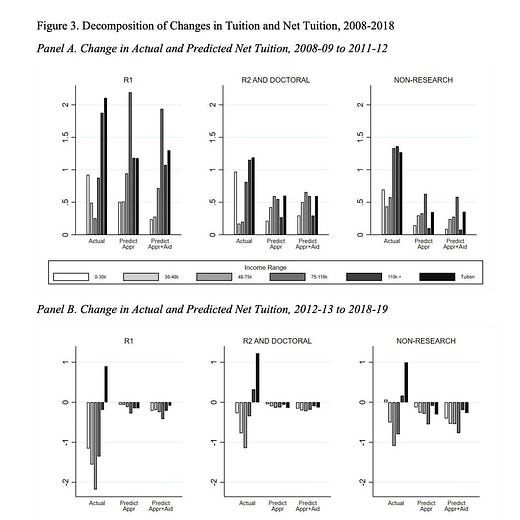
11:30 AM · Mar 14, 2022
14 Reposts · 78 Likes

Justin Wolfers@JustinWolfers
A thread exploring the literature on ways that exposure to war affects kids. The effects are remarkable not for their sign, but their enormous magnitudes, and the many margins at which war reshapes their life trajectories.

David Evans @DaveEvansPhD
Children & adolescents who experienced the Nigerian Civil War (1967-1970) were shorter in adulthood, which predicts "longevity, education, earnings, & the health of the next generation."
Published https://t.co/FSDB7WLmr2
Open access preprint https://t.co/X1ivOt2M0y
#CostofWar https://t.co/5sxHpZzqTE
12:22 PM · Mar 15, 2022
12 Reposts · 29 Likes

Jessica Leight@leightjessica
1/ Enjoyed seminar by @Susan_Athey at Georgetown yesterday presenting paper about the effects of contraceptive counseling + discounts in Cameroon, + an overview of process of running an adaptive RCT.
Short #EconTwitter 🧵 about the latter, for interested applied researchers
3:11 PM · Mar 18, 2022
34 Reposts · 153 Likes

Justin Sandefur@JustinSandefur
Remember the Doing Business index?
Yes, it died. Mostly due to the Kristalina Georgieva cooking the books for China thing.
But data manipulation aside, was DB actually good for development?
🧵
2:09 AM · Mar 16, 2022
108 Reposts · 344 Likes

Lee Crawfurd@leecrawfurd
In the other papers in my session,
@DrAboyadana presented his work showing that
free primary school in Ghana -> 1.5yrs more school ->
less smoking, healthier eating, lower blood pressure, less obesity, & safer sex
custom.cvent.com/4E741122FD8B4A…
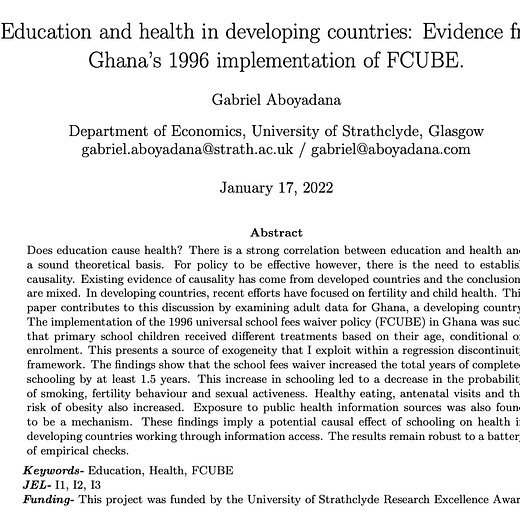
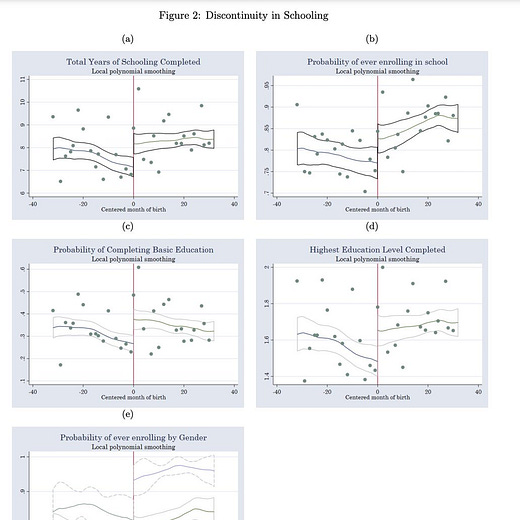
8:46 PM · Mar 14, 2022
8 Reposts · 16 Likes
^thread of multiple papers

Jared Rubin@jaredcrubin
We (@MarkKoyama & I) have a website for our book!
How the World Became Rich
Release date in US: 9 May 2022
Release date in UK: 24 March 2022
The website includes summaries of each chapter filled with figures. Check out the thread below...
howtheworldbecamerich.com
How the World Became Rich

3:32 PM · Mar 16, 2022
34 Reposts · 112 Likes
Public goods

David Brady@DaveBrady72
A while back, my genius collaborator @ukohler created a suite of "PSID Tools" for @Stata when using @umpsid that are EXTREMELY helpful. Crazily, we've forgotten to promote these. Check them out:
stata.com/meeting/german…
ideas.repec.org
PSIDTOOLS: Stata module to facilitate access to Panel Study of Income

6:25 PM · Mar 14, 2022
34 Reposts · 81 Likes

Suhem Parack@suhemparack
Academic Researchers 🚨🚨 We have a new tool for you that lets you get data from the #TwitterAPI v2 without writing code. Just add your bearer token, build your search queries and download data as CSV or JSON. Try it out and share with other researchers👇https://t.co/c2rwdbvU7L

Twitter Dev @TwitterDev
Today, we're also introducing the new Tweet downloader for Academic Researchers. 📚🔎 This new tool offers a no-code solution for people with Academic Research access to more easily utilize the full-archive search endpoint.
Learn more https://t.co/SPIpKCbU97
11:03 PM · Mar 15, 2022
108 Reposts · 290 Likes
Interesting discussions

Allison Shertzer 🇺🇦@econhist_allday
I'm talking to friends around the profession, and I'm worried covid has damaged seminar culture. Attendance is down, particularly for talks by junior scholars. There is less effort to provide feedback, especially on zoom.
5:48 PM · Mar 19, 2022
9 Reposts · 200 Likes
^request: more discussion and/or data on this

Almog Yalinewich@yalinewich
So it turns out you can run python on @overleaf
Here's an demo with homework exercises that are randomly generated every time the document is compiled

1:16 PM · Mar 19, 2022
617 Reposts · 3.44K Likes

Shengwu Li@ShengwuLi
Another way that assuming optimization reflects modeler humility:
The world is a complex place and the model captures only part of it. Often, when people behave in seemingly-suboptimal ways, that is because the model misses something important! 🧵
12:41 AM · Mar 15, 2022
22 Reposts · 181 Likes
^more from Jason Abaluck

Jimbo Brand@jamesbrandecon
I've been thinking a lot recently about the extent to which demand estimation can be automated. A lot of firms need to learn price elasticities, but there aren't many (especially open-source) attempts to make the path from data -> parameter estimates -> elasticities easy. 1/
5:46 PM · Mar 20, 2022
5 Reposts · 30 Likes

Anup Malani@anup_malani
Why have economics papers gotten so long over time (compared to say physics or comp sci or stats or biology papers)?
I do law and also economics. When I started 20 years ago, Econ profs used to mock law profs for writing 80pp papers. Now they all do it!
7:50 AM · Mar 16, 2022
35 Reposts · 438 Likes
^thread, good replies

